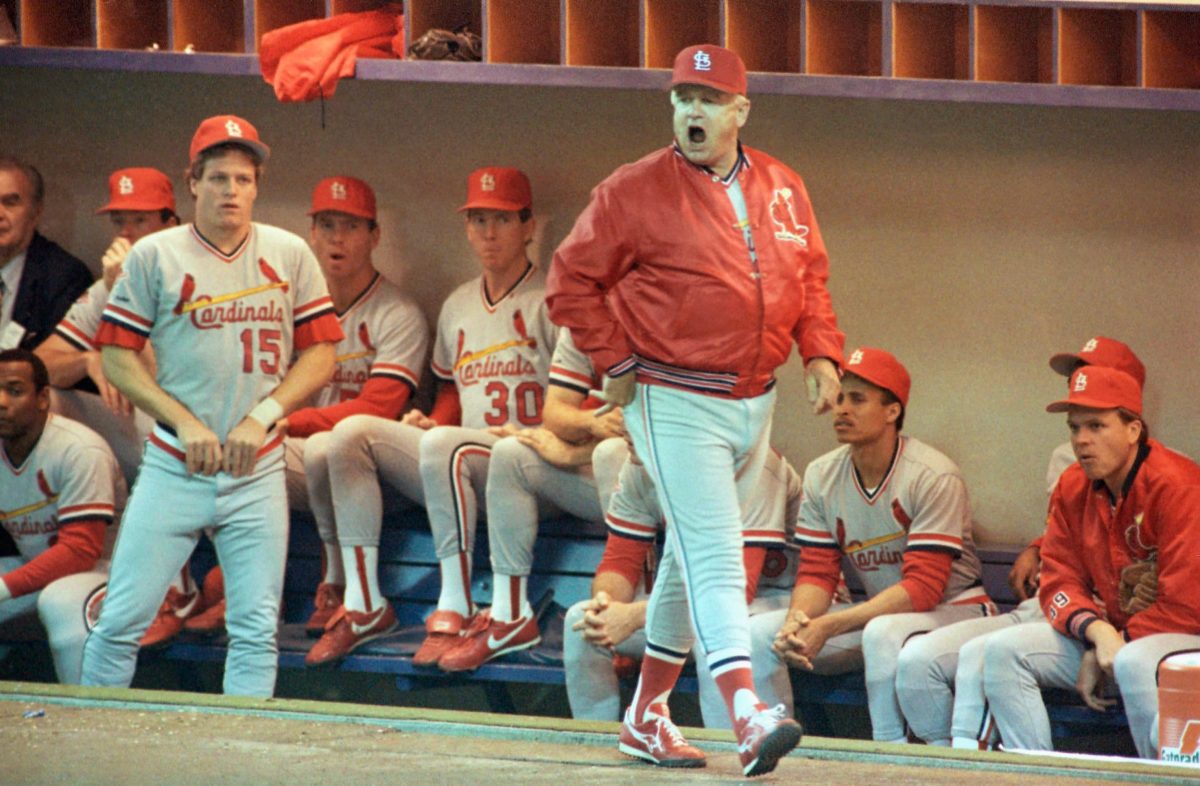



Reclaiming Balance in Baseball is a four-part special feature examining the forces pulling America’s pastime off its axis.
Part I begins with the role of instinct—the gut-level wisdom embodied by Whitey Herzog—before moving through analytics, free agency, and the soul of the game itself. From Curt Flood’s sacrifice to the rise of billionaire club owners, this series confronts what baseball has become—and what it still might be.
Scores of men in Major League Baseball’s storied history shaped my view of how the game should be played and cherished. Like music icons—Prince, Elvis, Dolly, Shania, Michael, Sinatra—whose names roll off the tongue, baseball’s legends evoke instant reverence: Jackie, Babe, Hank, Reggie, Brooks, Sandy, Stan-the-Man, Joe D, Mickey, Yogi, Ichiro, Pedro, Chipper, Big Papi, Jeter, Ohtani.
Only in baseball do managers don the uniform, their names etched in lore: Alston, Sparky, Durocher, Stengel, Torre, La Russa. Among the standouts, Dorrel Norman Elvert “Whitey” Herzog, a champion who saw baseball’s soul through intuition—not just numbers.
Whitey Herzog: The Master of Intuition
Herzog’s brief MLB playing career was modest—a .257 hitter with 25 homers—but his genius lay in leading teams. His journey:
1964–1970: Director of Player Development, Mets, shaping the 1969 World Champions and 1973 NL pennant winners
1975–1979: Manager, Royals, winning three straight AL West titles, thwarted by George Steinbrenner’s Yankees
1980–1990: Manager, Cardinals, clinching the 1982 World Series and three NL pennants
His “Whitey-ball”—speed, pitching, defense—epitomized National League ingenuity. Herzog shunned an early, more rudimentary form of what is now known as analytics, relying on instinct and scouting.
A sportswriter—distinct from Red Sox legend Johnny Pesky—supposedly coined Herzog’s nickname. Pesky, the namesake of Fenway Park’s famed Pesky Pole, later endorsed the moniker, drawing a connection to Herzog’s blonde hair—akin to Yankees pitcher Bob Kuzava’s “White Rat”—which soon became baseball’s embrace.
Self-effacing, Herzog quipped:
📌 “Baseball has been good to me since I quit trying to play it.”
His philosophy was simple:
📌 “Be on time. Bust your butt. Have some laughs while you’re at it.”
On managing pitchers:
📌 “We need three kinds of pitching: left-handed, right-handed, and relief… If you don’t have outstanding relief pitching, you might as well piss on the fire and call the dogs.”
Intuition vs. Analytics: A Pendulum Overswung?
Baseball once thrived on gut decisions. Today, analytics dominate, driven by Ivy League GMs—40% of general managers hail from elite schools like Harvard, Yale, and Princeton.
Billy Beane’s Moneyball era (2003), itself inspired by Dartmouth’s Sandy Alderson, ushered in data-driven front office power. Advanced metrics like bWAR, exit velocity, and defensive shifts diminish instinct’s role and reshape how players are evaluated.
The result? A game governed more by spreadsheets than sandlot sense.
This data dogmatism recalls a judicial debate—originalist justices who cling to statutory intent vs. living-document thinkers who adapt to context. Baseball’s own soul struggles similarly. While numbers offer precision, instinct provides heartbeat. Both must coexist.
As in commercial real estate (CRE), where my colleagues and I analyze KPIs like NOI and ROI, numbers inform—but never close—the deal. Baseball’s shift resembles Wall Street’s ETF dominance: efficient, but soulless.
📌 Herzog understood something the algorithms can’t capture:
“You don’t need a lot of statistics to know when a guy is playing well.”
Tomorrow’s installment will examine WAR and the Rise of Ivy League Analytics.
This four-part series runs through the weekend on World Baseball Network. If you missed it, be sure to read Restoring the Integrity of America’s Pastime, Reginald Armstrong’s Memorial Day column.
(AP Photo/Rusty Kennedy)